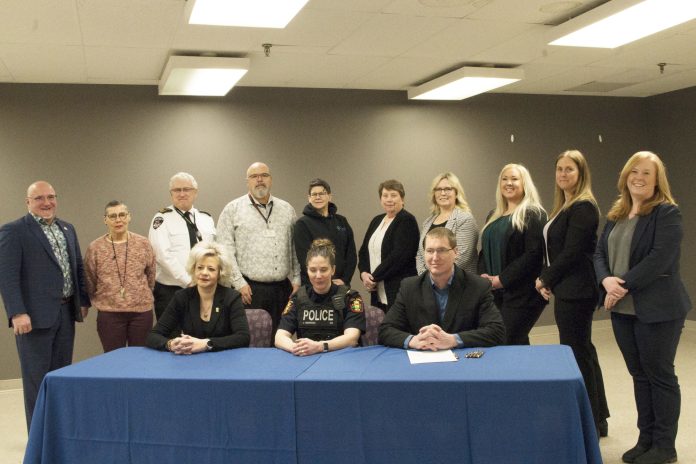
More than a dozen local and provincial organizations signalled their commitment to community safety on Tuesday by signing the Prince Albert and Area Community Threat Assessment and Support Protocol.
Representatives from each organization met at Plaza 88 over the noon hour for the first signing since 2016. The list includes three new signatories: Catholic Family Services of Prince Albert, YWCA Prince Albert, and the Saskatchewan Indigenous Institute of Technologies.
Prince Albert Catholic School Division trustee Chrissy Halliday signed the agreement on behalf of the division. She said it will help keep students safe by smoothing the lines of communication between the division and various community organizations.
“An agreement of this sort gives us the ability to properly assess and properly help our community members when they need it the most,” Halliday said.
“From a school perspective, when you look at places like Catholic Family Services and police services and the YWCA, they’re servicing, sometimes, the same families and the same students that we are, and so to be able to work collaboratively with them is essential.”
The PA Catholic School Division was a part of the group that signed the original protocol in 2013. The group re-committed to the protocol in 2016, and was supposed to hold another signing in 2020 to update some of the language, but those plans were scrapped due to COVID.
PA Catholic Superintendent of Education Charity Dmytruk said that ended up being a blessing in disguise because it created time for more organizations to jump on board.
Dmytruk also said the signing allowed them to update some of the language in keeping with best practices.
“For us, it is just a maintenance of the partnerships that have already been built to be supportive of those individuals who may need,” she said.
Insp. Lisa Simonson was on hand to sign the protocol on behalf of the Prince Albert Police Service (PAPS). Simonson said the protocol is extremely important for police, who rely on the information sharing portion to help appropriately assess risk and provide intervention if necessary.
“When there is no protocol in place you have agencies that are working within their own silos,” Simonson explained. “We could be working with those same subjects or individuals that may need that intervention and support and wouldn’t even know it, so this provides that sharing of information. It allows us to work together in partnership and provide the resources that are needed.”
As part of the protocol, signees commit to having staff members complete level one and two Violence Threat Risk Assessment (VTRA) training. Simonson said 33 PAPS officers have completed VTRA training, including eight who just finished the course in December.
She said all community groups have a role to play in school and community safety, so it’s encouraging to see so many signing on.
Each signing partner is responsible for assessing what information they share with other organizations. The partner organizations are also responsible for ensuring they comply with any legislation that applies to privacy and the sharing of information.
Signing partners follow three guidelines that determine what information to share. There must be a reasonable expectation of probable harm, the harm must constitute damage and detriment, not mere inconvenience, and there must be a connection between disclosing the information and preventing the anticipated harm.
“The presumption is that all information shared by partners should be treated with a high level of confidentiality,” reads the protocol. “Once sharing of information has occurred, each partner who receives the information will be responsible for ensuring appropriate storage, use, and disclosure.
The protocol is inspired by the work of the Centre for Trauma Informed Practices (CTIP) CTIP Canadian Director of Operations Pat Rivard was in Prince Albert for the signing, and for a two-day workshop at Plaza 88. He said it’s exciting to see so many organizations sign on.
“I have the luxury of a 40,000 ft view of Canada, and Prince Albert is advanced in how they are actually bringing the community together around some really core questions about community violence prevention,” he said. “This is fantastic. It’s a tribute to the leadership of the community.”
Rivard said it’s important to have consistent language for things like threat-making behavior, which improves communication between organizations. He added that having a shared responsibility among all agencies is also a positive.
“It is the heartbeat of violence prevention, quite honestly,” he said.

